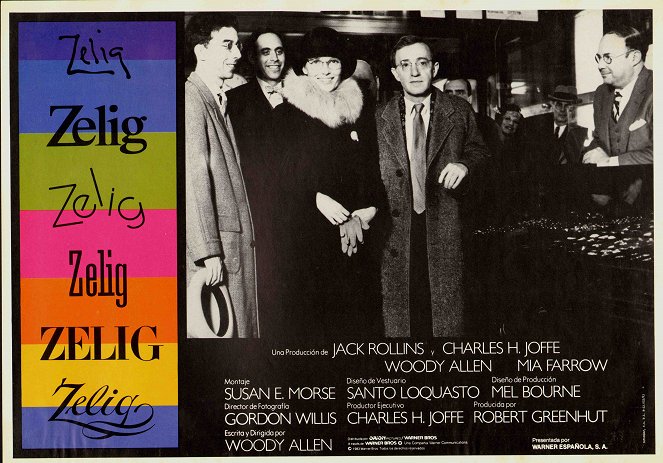Regie:
Woody AllenDrehbuch:
Woody AllenKamera:
Gordon WillisMusik:
Dick HymanBesetzung:
Woody Allen, Mia Farrow, Gale Hansen, Michael Jeter, John Rothman, Deborah Rush, Garrett M. Brown, Peter McRobbie, Kim Johnston Ulrich, Max Amann (Arch.) (mehr)Inhalte(1)
Leonard Zelig (Woody Allen) aus dem New York der 30er Jahre ist ein menschliches Chamäleon, d.h. er kann sich innerlich wie optisch binnen weniger Sekunden jeder Umgebung vollständig anpassen. Geht Zelig in eine Jazzkneipe, wird er zum Musiker, sitzt er zum Mittagessen beim Chinesen, mutiert er zum Asiaten. Als ihm nach kurzfristigen Ruhm in der Heimat Verfolgung droht, emigriert er nach Nazi-Germany, wo er gar zum SA-Mann wird. Seine Geliebte, die Psychologin Dr. Eudora Nesbitt Fletcher (Mia Farrow), läßt darauf nichts unversucht, ihr Chamäleon aus Adolfs Klauen zu befreien. (MGM Home Entertainment)
(mehr)Kritiken (4)
Zelig ist ein höllisch unterhaltsamer und gleichzeitig intelligenter Film, in den ich mich gerade verliebt habe. Eine bis ins letzte Detail ausgefeilte Mystifikation und Parodie voll von großartigen Ideen und unvergesslichen Szenen. Ich bin begeistert, meine schlechte Laune ist für heute futsch und Forrest Gump muss ich mir wahrscheinlich nie mehr anschauen. Die nächsten fünf Sterne für Woody Allen. "Zwei fanatische, idiotische, amerikanische Dummköpfe, kriminelle Schweinehunde, ruinierten in einer wichtigen Rede unseres Führers den besten Witz…“
()
Irgendwann musste es dazu kommen, ich versuche jetzt, Woody systematischer durchzugehen. Eine Kollektion der wesentlichen 20 DVDs und selbstverständlich etwas darüber hinaus habe ich schon seit mehreren Jahren. Aber mir fehlten der Schlüssel und das Interesse. Also variiere ich jetzt die Linie von Mia Farrow und wenn möglich, zumindest teilweise Retro. Und wie erging es Zelig nach dieser Entscheidung? Sehr schlecht. Eine Idee für einen kurzen fiktionalen Dokumentarfilm, der auf einen Dokumentarspielfilm angewendet wird. Danke, ohne mich.
()
In his early films, Woody was lively and showcased a whole geyser of gags that the audience loved, but then he longed to have more serious storytelling and "more serious" subjects. However, the audience desired that old good comedian and did not accept his seriously inclined films. Especially Stardust Memories ended in a painful failure - and I write this with the knowledge that in the case of Woody Allen's work, it was never about box office hits. Woody responded by returning to his comedic roots, but he approached it differently nonetheless. The humor in Zelig is more subtle and sophisticated, and the film is much more demanding both in terms of the script and production. The result is a satirical mystification, where Woody mocks conformity through the story of a man - a chameleon, who perfected his effort not to draw attention to himself and blend in with his surroundings. He is capable of not only changing his political beliefs or religious affiliation as needed but also his gender or skin color. With a terrifying ease, he adapts to any social environment and community. The Ku Klux Klan sees in his ability to become a member of any racial minority the greatest danger to America, while in Germany, Zelig becomes an enthusiastic Nazi. On another level, the film is also an excellent parody of biographical documentaries. Woody used authentic film material from the 1920s and 1930s and combined it with newly edited shots. The fictional Zelig thus appears in periodicals and documentary footage with real historical figures, and Allen lets actual experts talk about the whole case. Zelig is certainly among the most interesting and playful of Allen's films, and I admire the ant-like work and ideas, but this film is not a spontaneous favorite for me. Overall impression: 80%.
()
Another unforgettable Woody affair, set exactly between perfect satire and amazing comedy. I consider casting myself as Zelig a stroke of genius, because only Allen can endow the main protagonist with a special aura. Moreover, with each subsequent viewing, this genius matures up to the director's best films ever. This kind of idea is balanced with gold. This is something he brought upon himself after a Mexican meal.
()


Werbung